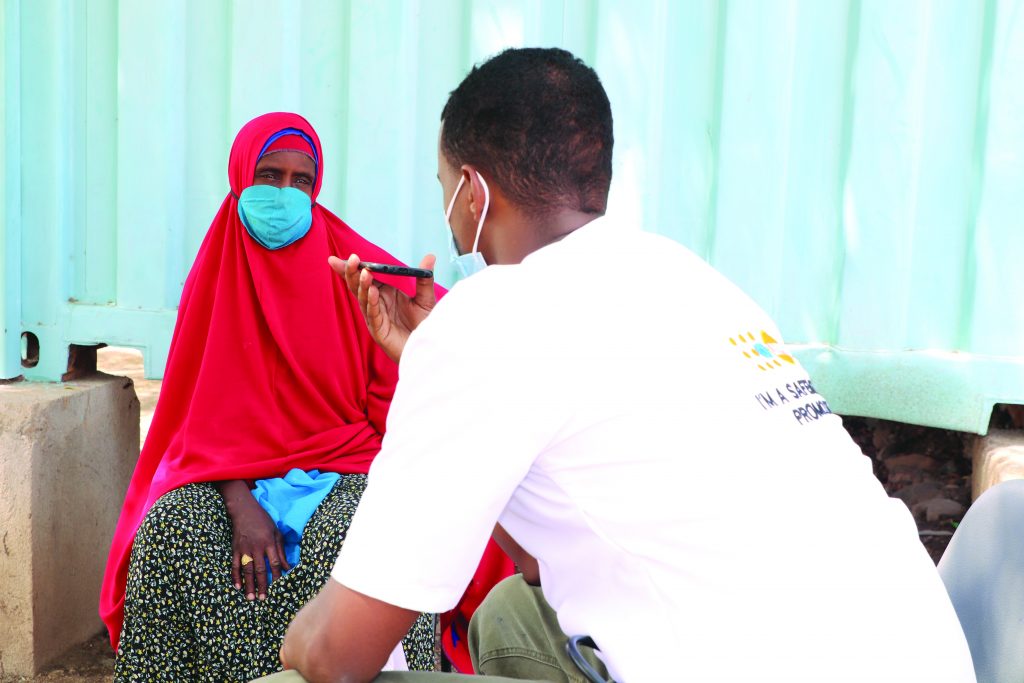Fighting TB in Refugee Camps: Hamed’s Story

For Hamed*, it has been a rough couple of years. Whereas at times life is hard for everyone, people find it hard to truly relate to her battle with Tuberculosis (TB) for over 10 years now, no matter how much she attempts to explain. As a 32-year-old refugee at Dadaab camp and a mother of six, her rough life has been a buildup of the bumpy patches she has experienced over the years.
Hamed was first diagnosed with TB while in Ethiopia 11 years ago. To date, she is not sure if it was Drug Resistant or Drug Sensitive TB but she was under medication for a period of one year. The gun battles in her home country, Ethiopia, pushed her family to seek refuge in Kenya. For the last 10 years, Dadaab has been her home. She relocated to Kalobeyie refugee settlement, within Dadaab, where she has been for the last five years.
In 2019, her 70-year-old husband passed on due to TB. Sadly, this was only confirmed after his death due to a late diagnosis. It was not clear if it was DSTB or DRTB as no follow-up was done after his death.
While in Dadaab, Hamed was diagnosed with TB, again. This time around, her two-year-old daughter was also diagnosed with TB and severe acute malnutrition. Despite being under medication and nutrition supplements for six months, her treatment failed necessitating re-initiation to treatment at Kalobeyei Health center which is manned by Red Cross Society- Kenya.
Her six-year-old son, unfortunately, was also diagnosed with Drug-Resistant TB in April, 2020.
“Since he started his treatment, he has really improved. He is doing much better than he was last year” Hamed notes.
The family has been battling stigma at the camp due to TB.
“None of my children leaves the house because they get beaten by the community members…. They are seen as outcasts. My oldest child has been beaten a number of times on the accusation they are spreading TB to community members. They are told because their mother and brother have TB and their father died of TB, they spread TB to the community when they go out to play. I can’t go to the market freely because I fear for
my life.” She says.
The sweltering heat which sometimes reaches 40 degrees Celsius during the day and drops to the low 30s at night offers no relief when they stay indoors. Besides the harsh climate at the camp, the labeling of Hamed* and her family as “Watu wa TB” (people with TB) has increased stigma impeding many patients from seeking medical assistance for fear of victimization.
Hamed* represents the growing number of refugees and displaced persons who are at risk of both TB and of inadequate TB services and treatment. Many refugee camps, just like Kakuma, are overcrowded and are often associated with inadequate access to water and sanitation, overdependency and disruption to normal social patterns which affect TB control programmes.
Coexistent illness and the poor nutritional status of many refugees also weaken their immune system making them vulnerable to developing TB. Since TB is more common in both countries of origin and in host countries, it is essential to involve key stakeholders from the region in the implementation of the key strategies.
The National TB Program (NTP) in collaboration with the Red Cross Society -Kenya, Refugees Affairs Secretariat, County Governments of Turkana and Garissa, and United Nations High Commissioner for Refugees has set priority in identifying and treating infectious patients in camps and ensuring they become non-infectious within two weeks of commencing their treatment.
As a sub-recipient of the Intergovernmental Authority on Development (IGAD) TB grant in refugee camps in Kenya, Red Cross supports NTP in ensuring TB patients are treated and cured to prevent the development of drug-resistant TB. They also support community education geared towards removal of stigmatization, early self-referral of TB clients and the importance of adherence to treatment.
